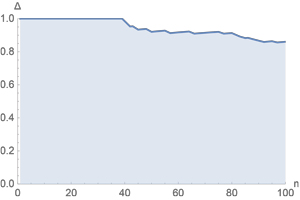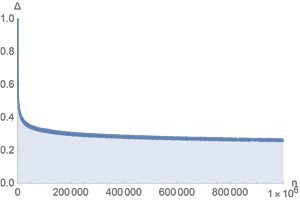Let $p(n)$ be a polynomial with integer coefficients. Define $\Delta( p(n) )$, the prime density of $p(n)$, to be the limit of the ratio with respect to $n$ of the number of primes $p(k)$ generated when the polynomial is evaluated at the natural numbers $k=1,2,\ldots,n$: $$ \Delta( p(n) ) \;=\; \lim_{n \to \infty} \frac{ \textrm{number of } p(k), k \le n, \textrm{that are prime}} {n} $$ For example, Euler's polynomial $p(n)=n^2+n+41$ starts out with ratio $1$, but then diminishes beyond $n=39$:

And it continues to diminish ...

... and by $n=10^7$ has reached $\Delta=0.22$.
Q. What is the largest known $\Delta( p(n) )$ over all polynomials $p(n)$?
In particular, are there any polynomials known to have $\Delta > 0$?
Maybe these questions can be answered assuming one or more conjectures?
